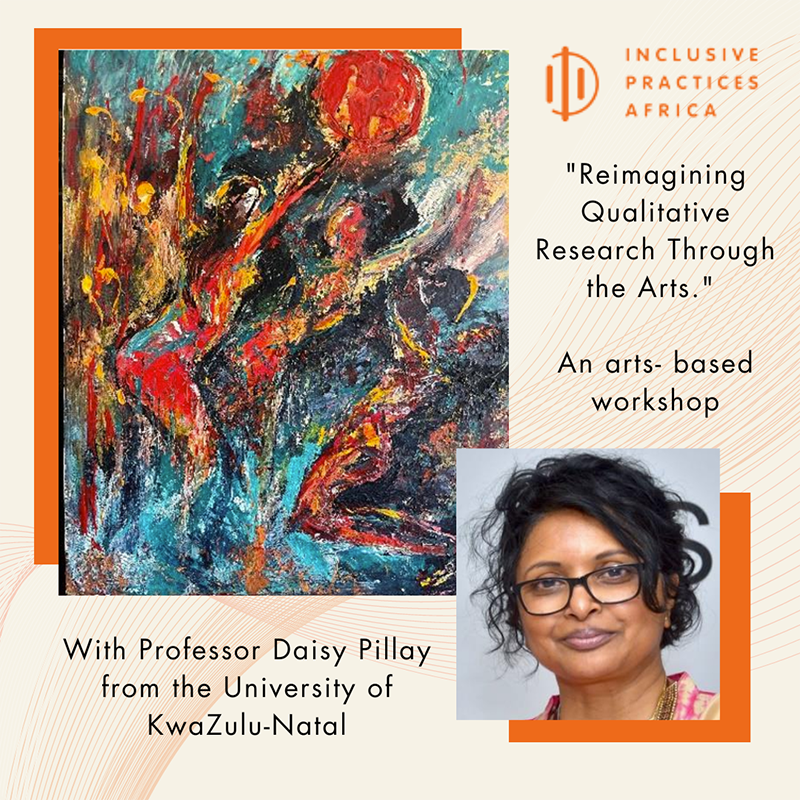
Date: Tuesday 14 April 2025
Time: 9:00am – 2:00pm
Venue: Neuroscience resource room 3 G-floor, Medical campus
Join us for an enriching workshop titled "Reimagining Qualitative Research Through the Arts," led by Professor Daisy Pillay, a distinguished scholar in the School of Education at the University of KwaZulu-Natal. This session offers a comprehensive overview of arts-based research—an interdisciplinary approach that blends creative expression with qualitative inquiry. Participants will explore the core purposes and diverse forms of arts-based research, while delving into the intersection of theory and artistic expression.
The workshop will also examine methods for ensuring research quality, ethics, and trustworthiness, and will showcase compelling examples from South African master's and doctoral students. Professor Pillay's work focuses on educational practice and identity studies, supporting educators in understanding their lives as ethically responsive individuals committed to innovative and diverse ways of thinking, knowing, and doing. Her scholarship in arts-based research, memory-work, autoethnography, and narrative inquiry has paved the way for transdisciplinary work and global connections, enabling experimentation with the aesthetic-ethical entanglements of self and its moral imperative.
RSVP:
Please contact Pearl at pearl.tukwayo@uct.ac.za to secure your spot. Spaces are limited.
While there is no charge for the workshop, participants are welcome to donate to Inclusive Practices Africa (IPA) to help cover the costs. Click the link below to donate!
We look forward to your participation in this unique opportunity to explore the intersection of art and research.
In South Africa, organisations supporting people with disabilities have existed for decades and have their origins in traditional welfare approaches to service delivery and inclusion, a colonial legacy that in many ways continues to influence their operations (SAHR, 2020). A connection between disability inclusion and welfare persists in South Africa and brings with it a mixture of paradoxical elements as the residue of traditional welfare mingles with a growing recognition of disability as a human rights issue (SAHR, 2020). The course aims to increase levels of practical application of disability inclusive consciousness and understanding through highlighting the factors that enforce exclusionary practices (i.e. historicity, response to disabilities, systemic and attitudinal disablement; relational understanding of disability; cultural narratives; social and political, spiritual constructions).
Most of the 26 higher education institutions in South Africa offer some form of support for students with disabilities. While some institutions have disability units, the need for training in disability inclusion is needed so as to promote this as a priority area. This course meets one of the strategic goals of the SDGS and UN CRPD Strategic Policy Framework on Disability for Post-School Education and Training System of professionalisation of disability rights units and student support services (Strategic Policy Framework on Disability for Post-Secondary Education and Training System, DHET, 2018). It will introduce participants to relevant knowledge and skills to begin to advance and facilitate disability inclusion within higher education institutions.
Despite the growing mandate to employ people with disabilities and despite progressive employment policies, a connection between disability inclusion and welfare persists in South Africa and brings with it a mixture of paradoxical elements as pertains to the employment of persons with disabilities. This course will shift thinking about disability inclusive employment practices from Charity and Checkboxes to Equity and Empowerment. This course will offer insights into how to review disability policies in participants’ workplace.
Foundations in Disability Inclusive Practices: Course Outcomes
- To develop a critical analysis of disability inclusion from individual, group, community and systemic contextual perspectives
- To explore disability as an issue of justice, diversity, transformation and belonging
- To develop disability inclusive personal and professional practices
Disability Inclusive Practices in the Workforce: Course Outcomes
- To develop critical thinking skills that inform responses, including attitudinal shifts, that promote disability inclusion in the workplace
- To gain knowledge of systemic perspectives of disability and disability inclusion in the workplace
- To identify practical strategies to address issues of inclusion in work contexts
The Disability Inclusive Practice in Higher Education course was offered twice during 2023 with Durban University of Technology and Central University of Technology in attendance. While these courses were offered in a synchronous manner. We also engaged in discussions with Higher Education Development South Africa and there is support for widening access to these short courses to more universities. We plan to develop this so that it can be delivered asynchronously, with some synchronous contact.
We have registered a Community-based Inclusive Development Short Course for 2024 which will be offered to practictioners, government employees (local and national), teachers, health personnel, social workers. The request for this training is supported by International NGOs, the International Disability and Development Consortium (IDDC) and the CBR Global Network (CGN), as well as various government ministries, including across Africa.
This course, developed in partnership with CBM will provide CBID practitioners, government employees (local and international), teachers, health personnel, social workers and healthcare practitioners with an opportunity with knowledge and skills to implement Disability Inclusive services. The course will attract scholarship funding from CBM and is set to be launched in March 2024.
The Disability Inclusive Practice in Higher Education course was offered twice during 2023 with Durban University of Technology and Central University of Technology in attendance. While these courses were offered in a synchronous manner. We also engaged in discussions with Higher Education Development South Africa and there is support for widening access to these short courses to more universities. We plan to develop this so that it can be delivered asynchronously, with some synchronous contact.
We have registered a Community-based Inclusive Development Short Course for 2024 which will be offered to practictioners, government employees (local and national), teachers, health personnel, social workers. The request for this training is supported by International NGOs, the International Disability and Development Consortium (IDDC) and the CBR Global Network (CGN), as well as various government ministries, including across Africa.
This course, developed in partnership with CBM will provide CBID practitioners, government employees (local and international), teachers, health personnel, social workers and healthcare practitioners with an opportunity with knowledge and skills to implement Disability Inclusive services.
